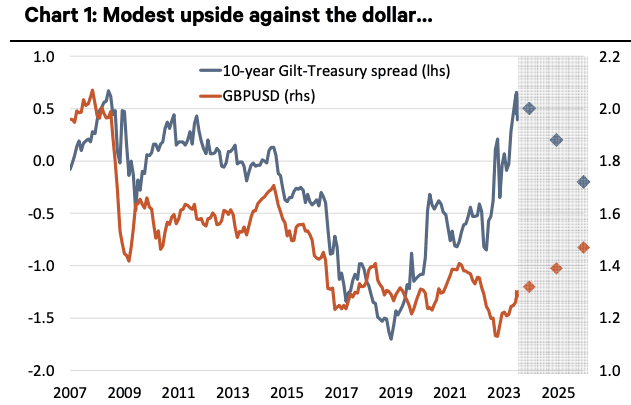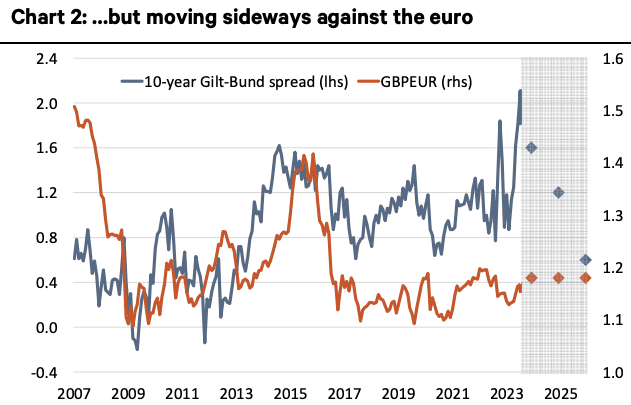Pound Sterling to Benefit against Euro and Dollar on Improved UK Political Backdrop says Berenberg
- Written by: Gary Howes
- UK no longer "populist-ridden" country
- Allowing UK to shed political risk premium
- Pound-Dollar headed towards 1.47
- Pound-Euro headed towards 1.18

File image of Kier Starmer and Rishi Sunak. Image credits: UK Parliament, Number 10.
An improved political outlook means the British Pound will see further upside against the Dollar and a steady trade against the Euro over the coming months and years, according to Berenberg Bank's latest assessment of the British Pound's prospects.
The 433-year-old private German bank says the UK's major political parties are no longer led by populists while improved relations with the EU and greatly diminished odds of a Scottish independence referendum will allow the Pound to be driven by fundamentals once more.
"Sterling has fallen badly out of favour with investors as a result of the UK's decision to leave the EU in June 2016," says Kallum Pickering, Senior Economist at Berenberg Bank in London.
But after being one of the most populist-ridden Western economies in recent years, Pickering argues "the UK now compares more favourably to its peers."
Between November 2015 and November 2016 Pound Sterling slid by 19% against the Dollar and 21% against the Euro with the majority of the fall occurring through June and July of 2016 as the shock of the UK's decision to leave the European Union hit financial markets.
"Was this move justified? Yes. By raising barriers to trade, investment and immigration with its biggest market (the EU), Brexit was about to turn the UK into a less dynamic economy with weaker trend growth. The pound lurched wildly for three years after the referendum with every shift in the potential probabilities over the Brexit outcome," says Pickering.
Compare Currency Exchange Rates
Find out how much you could save on your international transfer
Estimated saving compared to high street banks:
£2,500.00
Free • No obligation • Takes 2 minutes
The Pound struggled in the years following the Brexit vote amidst chronic political uncertainties as Prime Ministers changed and even the signing of a Brexit deal did not put to bed uncertainties.
Negotiations with the EU over Northern Ireland also held back the Pound, note Berenberg, but the striking of the Windsor Framework earlier this year marked a moment of improved relations between the EU and UK.
Pessimism peaked in September 2022 in the wake of Prime Minister Liz Truss's mini-budget which triggered a significant sell-off in gilt markets and the Pound as investors worried the UK's financial outlook was about to deteriorate markedly.
But this proved to be a turning point as the lessons of the Truss experiment triggered a return to orthodoxy under current leader Rishi Sunak.
Image courtesy of Berenberg.
The Labour Party, potentially set to take over Government in 2024, has meanwhile also changed shape with the far-left Jeremy Corbyn being replaced by centrist Kier Starmer.
"After being one of the most populist-ridden Western economies in recent years, the UK now compares more favourably to its peers," says Pickering.
"It is among the major economies that does not have either: a) a populist in power; or b) one waiting in the wings to challenge the next election," he adds.
This matters for foreign exchange markets which are highly sensitive to uncertainty and have allowed the Pound to slowly shed its political risk premium over recent months.
"The potential tail-risks from the far-left or far-right, as well as the risk that Scotland could leave the UK, have receded significantly. In our view, the likely improving domestic political situation in the UK can provide the basis for markets to return to a more fundamentals-focused approach to pricing the pound, with much less emphasis on political tail risks," says Pickering.
Compare Currency Exchange Rates
Find out how much you could save on your international transfer
Estimated saving compared to high street banks:
£2,500.00
Free • No obligation • Takes 2 minutes
The Pound is now vying for the title of 2023's best-performing major currency, alongside the Swiss Franc.
The Pound to Euro exchange rate is 3.0% higher since the year began at 1.1666 and the Pound to Dollar exchange rate is 6.2% higher at 1.2863. But gains against the Yen are the greatest at 15.38% while against the second-biggest loser, the Norwegian Krone, the advance stands at 9.50%.
But the improved political backdrop does not "automatically mean sterling should appreciate over time against all currencies," says Pickering.
Image courtesy of Berenberg.
Instead, he says it suggests that the UK's relative economic performance and the outlook for inflation and Bank of England (BoE) policy should once again be the dominant driver of sterling trends.
Against the Dollar, Berenberg expects a gradual appreciation to 1.47 from 1.29 currently, representing about 14% upside.
Two factors underpin this call: 1) a less strong dollar as markets turn more risk on through 2024 and 2025 on the back of an improving global economy; and 2) a narrowing of the US-UK growth gap coming from a less sluggish UK performance now that the political situation is improving and 3) somewhat less strong US growth as recent years' large fiscal tailwind turns more modest.
There is a valuation aspect at play too: whereas Pound Sterling trades towards the lower end of its post-2008 range versus the dollar, against the euro it remains well within its post-2008 range, notes Berenberg.
Sterling's upsurge from 2013 to 2015 was driven in large part by the Eurozone’s economic weakness in the wake of the euro crisis. However, Pickering notes as the Eurozone is no longer suffering from an acute crisis, the 2015 high for sterling is not a useful benchmark.
"We thus expect sterling to edge up slightly to 1.18 (from 1.16 currently) by year-end before oscillating around this level through end-2025, with UK and Eurozone GDP expanding by similar rates," says Pickering.






